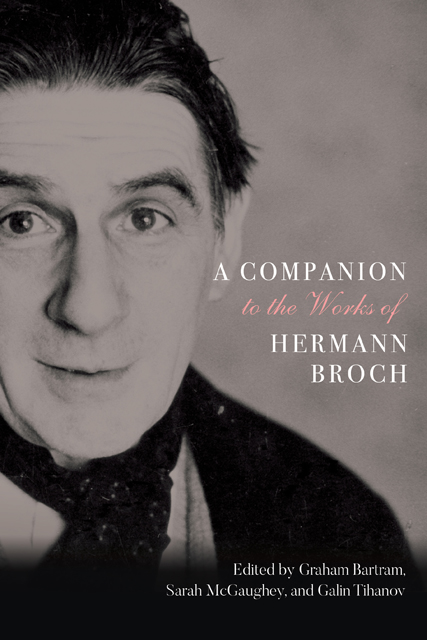Book contents
- Frontmatter
- Contents
- Preface
- Acknowledgments
- List of Abbreviations
- Introduction: Broch’s Life and Works
- 1 Perspectives on Broch’s Die Schlafwandler: Narratives of History and the Self
- 2 Hermann Broch and the Dilemma of Literature in the Modern Age
- 3 Interrogating Modernity: Hermann Broch’s Postromanticism
- 4 Broch and the Theater: Die Entsühnung and Aus der Luft gegriffen as Tragic and Comic Dramatizations of the Economic Machine
- 5 Limits of the Scientific: Broch’s Die Unbekannte Größe
- 6 Broch’s Die Verzauberung: Ludwig Klages and the Bourgeois Mitläufer
- 7 Hermann Broch’s Massenwahnprojekt and Its Relevance for Our Times
- 8 Human Rights and the Intellectual’s Ethical Duty: Broch’s Political Writings
- 9 Broch’s Der Tod des Vergil: Art and Power, Language and the Ineffable
- 10 From the “Tierkreis-Erzählungen” to Die Schuldlosen: The Creation of Broch’s Last Novel
- 11 Broch’s Legacy and Resonance
- Selected Bibliography
- Notes on the Contributors
- Index
8 - Human Rights and the Intellectual’s Ethical Duty: Broch’s Political Writings
Published online by Cambridge University Press: 20 January 2023
- Frontmatter
- Contents
- Preface
- Acknowledgments
- List of Abbreviations
- Introduction: Broch’s Life and Works
- 1 Perspectives on Broch’s Die Schlafwandler: Narratives of History and the Self
- 2 Hermann Broch and the Dilemma of Literature in the Modern Age
- 3 Interrogating Modernity: Hermann Broch’s Postromanticism
- 4 Broch and the Theater: Die Entsühnung and Aus der Luft gegriffen as Tragic and Comic Dramatizations of the Economic Machine
- 5 Limits of the Scientific: Broch’s Die Unbekannte Größe
- 6 Broch’s Die Verzauberung: Ludwig Klages and the Bourgeois Mitläufer
- 7 Hermann Broch’s Massenwahnprojekt and Its Relevance for Our Times
- 8 Human Rights and the Intellectual’s Ethical Duty: Broch’s Political Writings
- 9 Broch’s Der Tod des Vergil: Art and Power, Language and the Ineffable
- 10 From the “Tierkreis-Erzählungen” to Die Schuldlosen: The Creation of Broch’s Last Novel
- 11 Broch’s Legacy and Resonance
- Selected Bibliography
- Notes on the Contributors
- Index
Summary
One of the key passages in Hermann Broch’s 1945 novel, Der Tod des Vergil, is an expansive and intense dialogue between Virgil and Caesar Augustus. In a review of the novel for The Nation, Hannah Arendt enthusiastically describes this dialogue between the poet and the statesman as “one of the most truthful and impressive pieces in all historical fiction.”What strikes her as particularly salient, she writes in a letter to Broch a few months before the publication of her review, is that this novel achieves an “a priori” identity of its “speculative and poetic content.” This fortuitous mapping of philosophical problems onto poetry produces a “tension in which reflection and speculation themselves become the plot” (AB, 9).Arendt argues that the novel discusses fundamental epistemological, ethical, and political questions in relation to poetry more explicitly a way than any of Broch’s earlier literary writings. Although this kind of “speculative content” is particularly pronounced in Der Tod des Vergil, Broch’s literary texts are all constructed, albeit to varying degrees, as exercises in the activity of thinking. The burning desire to understand is the driving force Broch professes as the purpose of writing from his first publications through his last.
Unlike most writers, Broch can be considered a “convert” from philosophy to literature, which may explain his persistent inquiry into literature’s contribution to the production of knowledge.In this respect, Virgil’s definition of poetry in his dialogue with Augustus—“Ungeduld nach Erkenntnis” (KW 4, 300; impatience for knowledge; somewhat questionably translated in the English edition as “the craving for truth,” DoV, 320)—could just as easily have described Broch’s own approach to writing. In his 1933 essay on the perception of the world offered by novels, “Das Weltbild des Romans” (KW 9/2, 89–117; The Worldview of the Novel), Broch refers to a novel that follows this principle as polyhistorisch (KW 9/2, 115–16; polyhistorical). Polyhistoric writing is aptly defined as “a form of novel in search of knowledge, seeking the entire and real relationships in a contingent world.”Beyond knowledge, however, such a novel has the potential to reach what Broch characterizes as an absolute: despite the relativity and limitations of the world a novel creates, it exemplifies the “Unendlichkeit des ethischen Wollens” (KW 9/2, 115; infinity of the ethical will).
- Type
- Chapter
- Information
- A Companion to the Works of Hermann Broch , pp. 159 - 188Publisher: Boydell & BrewerPrint publication year: 2019



